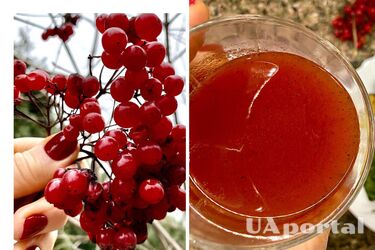Super viburnum berry: to be consumed daily, but never cooked

BLOG
No wonder Ukrainians planted viburnum wherever they could.
And it is not for nothing that this berry ripens by winter: it is the berry that should be preferred over all other berries at this time.
It should be on our table every day, followed by all the others.
Let me explain why. Each berry is filled with so many valuable substances that the person who eats it heals his whole body, all organs and systems.
It is in winter, when there is little light and the sun is almost invisible behind the clouds, when there is more time indoors, less movement, less really fresh vegetables and herbs, and it is at this time of year that sleep deteriorates, energy disappears, and all sores become more acute, that can be felt or seen only in the results of tests and ultrasound (atherosclerosis, insulin resistance, type 2 diabetes, impaired hematopoiesis, a tendency to blood clots, changes in the structure of blood vessels and capillaries, hypertension, and many others).
Urbanized, accustomed to supermarket vegetables, imprisoned in plastic, we have forgotten the voice of our native land, where our ancestors lived for centuries and survived precisely because of the gifts of this land.
Everything is logical with viburnum, its composition is impressive.
It contains a lot of vitamin C, which is necessary for the functioning of immune cells, for the quality construction of all blood vessels, a dense endothelial structure that prevents "fragility", edema, ensures good functioning of muscle cells, and promotes good functioning of mucous membranes. It is in winter that most people have latent hypovitaminosis C.
Contains vitamin K, which makes blood vessels dense and reduces the risk of hemorrhage. This vitamin is deficient in drinkers, those with liver steatosis and those who take or have taken antibiotics.
Viburnum contains a lot of magnesium, selenium, zinc, but especially a lot of Niacin, vitamin B3, which normalizes cholesterol levels and has a positive effect on various forms of dyslipidemia - freshly picked viburnum berries can contain up to 1300 mg of niacin! By the way, niacin is included in international protocols for the treatment of atherosclerosis.
Considering that all people have atherosclerosis, even children, it becomes clear that every home should have viburnum.
Niacin is also an antimutagen that prevents DNA damage (the spiral strands that make up genes) and the development of tumors.
The activity of the proteins of youth, the sirtuins, which are associated with a decrease in oxidative stress in neurons, depends on the niacin content in the diet.
The activity of sirtuins increases in the presence of polyphenols, which are abundant in viburnum.
Regular consumption of viburnum (at least a monthly "course") improves the condition of the smallest vessels - capillaries that supply oxygen and nutrients to the brain.
Viburnum should not be cooked, i.e., decoctions should not be made from its berries, only infusions should be made.
Moreover, even the heart-shaped seeds and twigs should be used.
I wash the viburnum branches in running water, put them in a blender and pour hot water, whisk, let it brew for at least 5 minutes, strain and drink.
If you have never used viburnum, start with half a glass.
Viburnum juice is also great for marinating meat or fish, adding juice and berries to salads - tannins and organic acids improve the absorption of protein foods and promote better digestion.
Ukrainians love and celebrate viburnum for a reason: it is one of the symbols of our longevity and strength.
So if you see an old lady selling viburnum, never pass by!

